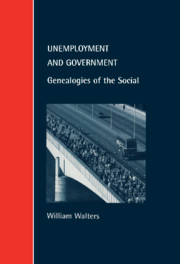Book contents
- Frontmatter
- Contents
- Acknowledgements
- Introduction
- 1 The Discovery of Unemployment
- 2 Inventing Unemployment: The Birth of the Labour Exchange
- 3 Governing Unemployment as a ‘Risk’
- 4 Governing Through the Long-Term Unemployed: Unemployment Between the Wars
- 5 Unemployment and its Spaces
- 6 Governing Divided Societies: The New Deal
- Conclusion
- Notes
- Index
6 - Governing Divided Societies: The New Deal
Published online by Cambridge University Press: 07 September 2010
- Frontmatter
- Contents
- Acknowledgements
- Introduction
- 1 The Discovery of Unemployment
- 2 Inventing Unemployment: The Birth of the Labour Exchange
- 3 Governing Unemployment as a ‘Risk’
- 4 Governing Through the Long-Term Unemployed: Unemployment Between the Wars
- 5 Unemployment and its Spaces
- 6 Governing Divided Societies: The New Deal
- Conclusion
- Notes
- Index
Summary
The first four chapters in this book have dealt largely with some of the problematizations out of which the modern conception of unemployment and unemployment policy arose. The previous chapter introduced a range of more contemporary concerns, albeit largely from the perspective of the different spatializations of the unemployment question presupposed by various governmental programmes and strategies. In this final, substantive chapter I want to complement my historical focus with a case study of a very recent initiative within unemployment policy – the Labour Government's New Deal for the unemployed. Labour has presented this as ‘[t]he largest assault on structural unemployment ever undertaken in this country’.
It would be misleading, however, to suggest that this chapter was somehow bringing our discussion of unemployment ‘up to date’. For this study does not pretend to be a comprehensive history of unemployment policy. Rather, it should be read as a series of strategic encounters with historical materials, engagements which are intended to sharpen our comprehension of the present. One of the central tasks of this book has been to enhance our understanding of what it means to govern unemployment from a ‘social’ perspective. The contribution of this chapter is to assess whether the approach to the unemployed which is currently fashionable with governments, an approach variously described as ‘workfare’ or ‘welfare-to-work’, and which the New Deal seems to exemplify, can still be considered a form of social governance.
- Type
- Chapter
- Information
- Unemployment and GovernmentGenealogies of the Social, pp. 121 - 143Publisher: Cambridge University PressPrint publication year: 2000



